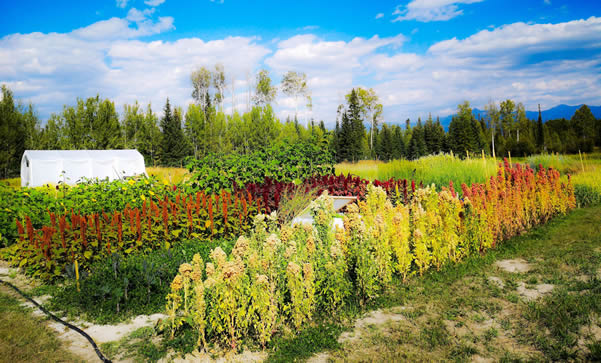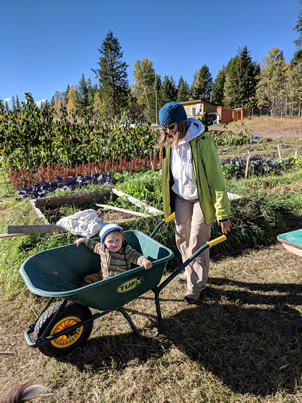The Growing Edge: Feed a Family Initiative in Canada
James Christie-Fougere and Sharon Coombs were Ecology Action interns in 2016. In the spring of 2018 they founded the Kootenay Society for Sustainable Living and established a GROW BIOINTENSIVE Research and Demonstration Mini-Farm in the mountains of the East Kootenay region in British Columbia, Canada. Their young son, Lincoln, is a part of their daily life on the Mini-Farm. Sharon and James are currently working towards their GROW BIOINTENSIVE Basic-Level Teacher Certification. Here is a report of their recent activities: Once we returned home from our internship, we spent the first year establishing a 4,500-square-foot garden, and running variety trials, in order to determine which crops were suitable for our climate. We hosted weekly workshops and tours in hopes of empowering the people in our community to start growing their own food. We were very encouraged by the number of people who came to see and learn, and by the enthusiasm with which people thanked us for our work. We believe building a strong and resilient community is the key to local food security, and the people we met agreed we all need to work together.
While we processed our harvested grain this fall, we talked about ways we could continue our research while also supporting our community with healthy food. We came up with the Feed a Family Initiative, an undertaking that will not only create funding for our project but will also provide food for families in need in our community. Here's an overview of the initiative:
With this initiative, supporters of our project can help fund ongoing research and development, help us continue to offer free workshops and tours and assist us as more farmers are trained. At the same time they will see their donation turn into healthy organic food that will feed a family in need in our community.
We feel especially fortunate that Lincoln has the opportunity to spend so much time in the gardens. Even though he's not yet two years old, he's already trying to help water the beds, pull weeds and plant seedlings, and we hope that he'll grow up with an appreciation for biodiversity and things that grow. Ultimately our work is aimed at benefiting the next generation and ensuring Lincoln will inherit a world of plenty, and be inspired to protect our natural resources. Once established our hope is that the Feed a Family Initiative will become a blueprint and a foundation for more community supported agriculture (CSA); a system that doesn't rely on a single large farm to produce food for many, but rather on many small gardens sharing and supporting each other. CSAs can work together to feed great numbers of people and raise money to grow and expand. We'd like to lead by example and create the framework needed for more people to grow food for each other. With the right crops and the valuable data we collect we can increase food security, together!" If we are successful, we would then share this blueprint with our colleagues, such as 2016 intern, Sammy Kangethe in Kenya, and help establish similar projects in their home countries. The Feed a Family Initiative will help raise funds for their research and also enable them to feed their community. As GROW BIOINTENSIVE Teachers we can continue to educate and empower the people in our communities, and feed them at the same time!" To learn more about the Kootenay Society for Sustainable Living, or to support our work please visit our website www.growsustainability.org or contact us at contact@growsustainability.org.
top | Newsletter Home |Table of Contents| Archive
|



 We collected as much data as we could during this past season and learned a lot about our micro-climate and the challenges of maintaining a sustainable farming system in this region. At roughly 3,600 feet elevation we have a 4-month growing season. We found there are no frost-free growing months and experienced dim smoke-filled skies due to area wildfires, for the entire month of August. Even with these challenges our gardens thrived using the GB method! The research here will be ongoing as we work towards acclimatizing crops to our cold environment and minimizing the resources required to produce a complete diet for the entire year.
We collected as much data as we could during this past season and learned a lot about our micro-climate and the challenges of maintaining a sustainable farming system in this region. At roughly 3,600 feet elevation we have a 4-month growing season. We found there are no frost-free growing months and experienced dim smoke-filled skies due to area wildfires, for the entire month of August. Even with these challenges our gardens thrived using the GB method! The research here will be ongoing as we work towards acclimatizing crops to our cold environment and minimizing the resources required to produce a complete diet for the entire year. 
